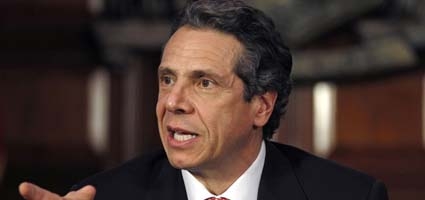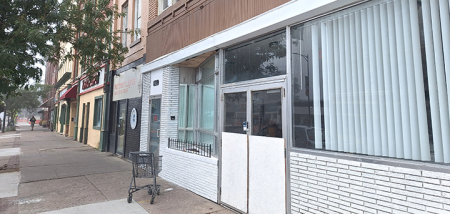Cuomo, Legislature Strike On-time NY Budget Deal
Published:
March 28th, 2012

ALBANY (AP) ‐ New York is poised to embark on a large economic development program, provide more assistance to the poor, and increase spending on public schools under a budget deal announced Tuesday by Gov. Andrew Cuomo and legislative leaders.
The basic welfare grant for poor families would increase by 10 percent this year, Cuomo will have money to provide incentives for improved schools, and billions in state and federal dollars will be committed to economic development and rebuilding the state's infrastructure, guided in part by a "New York Works" task force to improve coordination of the spending.
"The cornerstone of this budget is the New York Works program," Cuomo said. He called it "a new and smarter strategy for putting New Yorkers back to work by rebuilding our aging infrastructure and helping put our state's economy back on track, just the way we have put our state government back on track."
The joint announcement says the budget deal "closes a multibillion-dollar deficit with no new taxes, fees or gimmicks." The deal would pay in part for a rare if modest tax break of $200 to $400 for most middle-class families. It does not mention a "millionaire tax" adopted in December that raised $2 billion to help subsidize the tax cuts and the annual $300 increases in tuition for five years now under way for the State University of New York and City University of New York.
The dealing on the $132.5 billion budget ended Tuesday after the latest in a string of overnight negotiations. The Legislature is expected to start passing the bills Wednesday and be finished by Friday at the latest. That would result in the second straight on-time budget in a state known for decades for being late.
"We have turned the corner in Albany," said Senate Majority Leader Dean Skelos, a Nassau County Republican.
"This budget includes much needed increases in education spending, including an increase in base aid for community colleges for the first time in five years, and vital restorations to programs that protect our state's neediest citizens," said Assembly Speaker Sheldon Silver.
There is no return of the pork-barrel spending known as "member items" in this budget, the second year the grants distributed at the discretion of lawmakers for pet projects in their home districts have been left out since Cuomo took office.
The Legislature and Cuomo agreed to several compromises over the proposals Cuomo submitted two months ago. Among them was to put back into general aid for all schools about $200 million Cuomo wanted for competitive grants to spur improved school district performance. Cuomo will keep $125 million for the coming school year for the grants aimed at encouraging efficiency and rewarding performance.
School aid would increase by $800 million in total, a roughly 4 percent increase over the $21 billion spent on public schools this fiscal year.
In addition to the $16 billion New York Works program, the deal includes a $1 billion investment in and around the city of Buffalo and a statewide economic development and jobs program. A $1.2 billion state-federal infrastructure program will provide jobs to complete major projects statewide, including replacement of the Tappan Zee Bridge.
Cuomo will also get his gambling commission to plan an expansion of up to seven non-Indian casinos and a commission to evaluate tax breaks and incentives and map out a taxing strategy. Nearly $90 million would also be spent to improve parks statewide.
Cuomo also landed a speedup of teacher disciplinary hearings and a law that would deny school aid increases to any district that fails to establish a teacher evaluation process based on state guidelines. He said at a news conference he'll later discuss later with lawmakers privacy concerns raised about evaluations but said he believes parents' right to know outweighs teachers' rights to privacy.
Cuomo has also gained flexibility to consolidate "back office" operations to save money, such as purchasing and personnel services in a compromise that limits the broad wording of a proposal that concerned lawmakers.
Other compromises include:
‐ Increasing the basic welfare grant by 5 percent in June and by another 5 percent in October. Cuomo had sought to delay half of the increase by more than a year, citing the state's slow economic recovery. The basic welfare grant is now about $350 a month for a family of three.
‐ Filling the Medicare prescription coverage gap known as the "doughnut hole" for the elderly to help pay for most of the unexpected cost of co-pays until the federal health care program corrects the gap.
‐ $25 million to help New Yorkers protect their rights to refinance and other options when they face foreclosure on their homes.
‐ Increasing state funding for community colleges by $31 million.
‐ Funding for the "startup" of three legal aid-type offices specifically aimed at protecting illegal immigrants from abusive employers and from financial and sexual abuse.
‐ Providing $100 million for upstate road and bridge projects to balance an increase in capital funding for the Metropolitan Transportation Authority, which serves New York City and its suburbs.
‐ Two measures sought by the working poor and immigrants. One would make sure a physician's order ‐ even if he or she calls for a higher priced brand name drug over a generic ‐ will prevail over a health insurance company or pharmacist. The other would make sure prescriptions are easily understood, with instructions in different languages if necessary to avoid accidental misuse.
The Senate's Republican majority refused to agree to create a "health exchange," or state-based health insurance market required under President Barack Obama's health care overhaul, for individuals and small businesses to insure more Americans. Since the Legislature didn't include a health exchange tailored to New York, Cuomo said he will establish one shortly by executive order.
The proposal would increase spending 1.9 percent, the rate Cuomo proposed two months ago, while dispatching with a $2 billion deficit. If approved as planned, the budget will follow Cuomo's freshman-year spending plan, which included an even rarer cut in overall spending, while closing a $10 billion deficit.
Just seven spending plans were approved on time since 1975.
Comments







